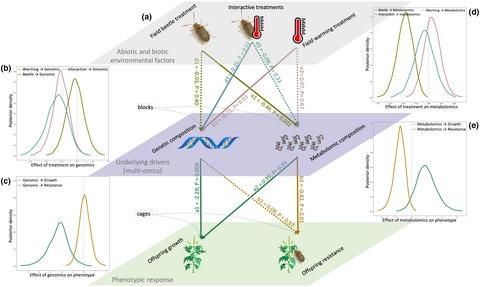当前位置:
X-MOL 学术
›
Ecol. Lett.
›
论文详情
Our official English website, www.x-mol.net, welcomes your
feedback! (Note: you will need to create a separate account there.)
Climate warming can reduce biocontrol efficacy and promote plant invasion due to both genetic and transient metabolomic changes
Ecology Letters ( IF 7.6 ) Pub Date : 2022-04-05 , DOI: 10.1111/ele.14000 Yan Sun 1, 2 , Tobias Züst 3 , Daniele Silvestro 2, 4, 5 , Matthias Erb 6 , Oliver Bossdorf 7 , Pierre Mateo 6 , Christelle Robert 6 , Heinz Müller-Schärer 2
Ecology Letters ( IF 7.6 ) Pub Date : 2022-04-05 , DOI: 10.1111/ele.14000 Yan Sun 1, 2 , Tobias Züst 3 , Daniele Silvestro 2, 4, 5 , Matthias Erb 6 , Oliver Bossdorf 7 , Pierre Mateo 6 , Christelle Robert 6 , Heinz Müller-Schärer 2
Affiliation

|
Climate change may affect plant–herbivore interactions and their associated ecosystem functions. In an experimental evolution approach, we subjected replicated populations of the invasive Ambrosia artemisiifolia to a combination of simulated warming and herbivory by a potential biocontrol beetle. We tracked genomic and metabolomic changes across generations in field populations and assessed plant offspring phenotypes in a common environment. Using an integrated Bayesian model, we show that increased offspring biomass in response to warming arose through changes in the genetic composition of populations. In contrast, increased resistance to herbivory arose through a shift in plant metabolomic profiles without genetic changes, most likely by transgenerational induction of defences. Importantly, while increased resistance was costly at ambient temperatures, warming removed this constraint and favoured both vigorous and better defended plants under biocontrol. Climate warming may thus decrease biocontrol efficiency and promote Ambrosia invasion, with potentially serious economic and health consequences.
中文翻译:

由于遗传和短暂的代谢组变化,气候变暖会降低生物防治功效并促进植物入侵
气候变化可能影响植物与草食动物的相互作用及其相关的生态系统功能。在实验进化方法中,我们将入侵性豚草的复制种群置于模拟变暖和潜在生物防治甲虫食草的组合中。我们追踪了田间种群中几代人的基因组和代谢组变化,并评估了共同环境中的植物后代表型。使用综合贝叶斯模型,我们表明,后代生物量的增加是通过种群遗传组成的变化来应对变暖的。相比之下,对草食动物的抵抗力增强是通过植物代谢组谱的变化而没有发生遗传变化,很可能是通过跨代诱导防御。重要的是,虽然在环境温度下增加抗性的代价很高,但变暖消除了这种限制,并有利于生物防治下的活力和防御能力更强的植物。因此,气候变暖可能会降低生物防治效率并促进豚草入侵,从而带来潜在的严重经济和健康后果。
更新日期:2022-04-05
中文翻译:

由于遗传和短暂的代谢组变化,气候变暖会降低生物防治功效并促进植物入侵
气候变化可能影响植物与草食动物的相互作用及其相关的生态系统功能。在实验进化方法中,我们将入侵性豚草的复制种群置于模拟变暖和潜在生物防治甲虫食草的组合中。我们追踪了田间种群中几代人的基因组和代谢组变化,并评估了共同环境中的植物后代表型。使用综合贝叶斯模型,我们表明,后代生物量的增加是通过种群遗传组成的变化来应对变暖的。相比之下,对草食动物的抵抗力增强是通过植物代谢组谱的变化而没有发生遗传变化,很可能是通过跨代诱导防御。重要的是,虽然在环境温度下增加抗性的代价很高,但变暖消除了这种限制,并有利于生物防治下的活力和防御能力更强的植物。因此,气候变暖可能会降低生物防治效率并促进豚草入侵,从而带来潜在的严重经济和健康后果。











































 京公网安备 11010802027423号
京公网安备 11010802027423号